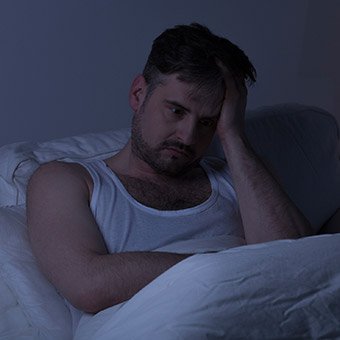Sleep Hygiene – Powell, OH
How to Get Great Sleep Every Night
In addition to eating a balanced diet, getting regular exercise, and taking consistent care of your teeth, quality sleep is also vital to your long-term overall health. At our office, we want our patients to have as many tools as possible to help them overcome chronic sleep issues such as sleep apnea and snoring. By following a few simple steps every day, you can quickly increase the quality and quantity of your sleep and start feeling results the very next morning.
Why Choose Powell Dental Sleep Solutions for Help with Sleep Hygiene?
- Doctor with more than 30 years of healthcare experience
- Treatment Includes Take Home Calibration Sleep Test with No Fees
- Multiple treatment options under one roof
What is Good Sleep Hygiene?

Healthy sleep habits can make the difference between restless or restful slumber. It can also make a difference in the severity of obstructive sleep apnea experienced during the night. Lifestyle modification is often necessary for instituting proper sleep hygiene. Some habits that can improve your sleep health include:
- Be consistent. Adhere to fixed bedtime and awake times, including weekends.
- Obtain an adequate amount of sleep-- a minimum of 7-9 continuous hours each night.
- Make sure your bedroom is quiet, dark, relaxing, and at a comfortable temperature.
- Remove electronic devices, such as TVs, computers, and smart phones from the bedroom.
- Avoid large meals, caffeine, and alcohol at least four hours before bedtime.
- Get some exercise. Being physically active during the day can help you fall and stay asleep.
- Give up your worries. They will still be there for you the next morning. Good sleep will help you deal with them.
- Avoid sleep deprivation
- Avoid sleeping on your back if you snore or have OSA
What Should You Do If You Can’t Go to Sleep?

If you can’t go to sleep within 30 minutes, there are a few options you might try. Consider the temperature and comfort of your room. A cool and quiet room is more conducive to sleep. If you have sleep onset insomnia, you should leave the bedroom and move to a different room that is warm with soft low lighting. You should try to read a boring book until you get sleepy. Do not watch TV or engage in similar activities. A warm glass of milk is often helpful, but avoid placing chocolate syrup in it. Prevent self-talk that keeps your brain stimulated. Consciously try to erase repetitive thoughts moment-by-moment.
Questions a Sleep Doctor May Ask

If you have practiced good sleep hygiene, but your sleep problems persist or interfere with how you feel or function during the day, you should seek a professional evaluation and treatment by a medical physician, preferably one familiar with treating sleep disorders. Before you visit, keep a diary of your sleep habits for ten days. In the diary, keep track of:
- What time did you go to bed?
- What time did you go to sleep?
- What time did you awaken?
- Did you awaken on your own or using an alarm clock?
- What time did you get out of bed?
- Did you take any naps?
- What type of exercise did you get?
- Did you consume alcohol?
- Did you consume caffeinated beverages?
- What time did you eat before going to bed?
- How many times did you awaken during the night?
- Do you have a bed partner?
- Do any animals or children sleep in your bed with you?
- How many hours did your work each day?
- Did you have any blue light exposure more than one hour prior to bedtime?
- What thoughts were you having while waiting to sleep?
- Did you take any sleep medications?
- What other medications did you take and at what time?
- Describe your sleep environment
- Did your legs or arms bother you?
- Did you smoke before bedtime?
What is Insufficient Sleep Syndrome?

ISS is considered one of the most common causes of daytime sleepiness and fatigue. It is also causative in patients exhibiting difficulties with memory, attention, and psychomotor performance. Determining the cause of insufficient sleep is important and can often be attributed to poor sleep hygiene. It is seen when actions do not allow the person to wind down and prepare for sleep sufficiently. It can also occur due to self-imposed sleep deprivation from working long hours, wanting to stay up to say hello to a loved one who works late, or from nighttime computer and TV use.
Stress, poor time management, over-extension of responsibilities, and prioritizing activities over sleep are common causes of ISS. This syndrome can lead to obstructive sleep apnea as well as many severe health consequences. It is important to overcome habits that can lead to this destructive behavior and ultimately harm your health.
